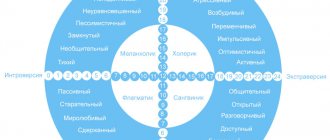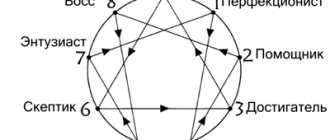The online temperament test (Eysenck Personality Inventory), also known as PEN, is one of a series of questionnaires by the German-British psychologist G. Y. Eysenck. The test helps determine results on three main scales - Psychoticism, Extraversion and Neuroticism. It is the names of these scales that make up the title of the questionnaire - PEN. A sincerity scale has also been added to the test, designed to exclude deliberate improvement of one’s image. The Eysenck Personality Questionnaire allows not only indicators of psychoticism, neuroticism and extraversion, but also to determine your type of temperament. At the end of the article, you will be able to take this temperament test online and get results immediately.
Online temperament test: description of scales
Sincerity scale
This scale is designed to increase the frankness of responses. A high result on it may indicate insincerity in taking the test. Or it may reflect pretense and demonstrative behavior in order to obtain constant social approval. Try to take the test honestly, without thinking about the impression your answers might make on someone.
Extraversion-Introversion Scale
This scale reflects the tendency towards extraversion or introversion. People who are commonly called extroverts tend to be sociable and outward-looking. They are full of energy, and they simply need new acquaintances and challenges. They are characterized by the following features: hot temper, impulsiveness, good nature, carelessness. They prefer to act quickly, on the spur of the moment. They are also prone to taking risky actions. They rarely fully control their emotions and actions.
Introverts are the complete opposite. They are more often turned inward, closed, calm, and shy. They are prone to introspection, control of their thoughts and emotions. Such people carefully think through their actions and rarely trust sudden impulses. Their social circle is often narrow. The character is dominated by pessimism and a high value of social and moral norms.
In reality, most people are somewhere between these two extremes. Depending on the context of the situation, either one or the other traits may predominate in us.
Neuroticism scale
The Neuroticism Scale helps characterize emotional stability or instability. People with high levels of neuroticism are usually subject to rapid mood swings and are emotionally unstable. They are also often prone to excessive soul-searching, worrying, and catastrophizing. They may be irritable, anxious and restless. A high level of neuroticism is also characterized by strong reactions to any negative stimuli. Under unfavorable conditions, people with high scores on this scale are prone to the appearance of neurosis.
Psychoticism scale
The psychoticism scale indicates a tendency to inappropriate reactions and antisocial behavior. People with high scores on this scale have difficulty adapting to society. It is difficult for them to work with people, they can be conflicting and non-communicative.
Theoretical basis
Reactions of people of different types of temperament in the same situation (drawing by X. Bidstrup)
G. Eysenck, having analyzed the materials of a survey of 700 neurotic soldiers, came to the conclusion that the entire set of traits that describe a person can be represented through 2 main factors: extraversion (introversion) and neuroticism.
The first of these factors is biopolar and represents a characteristic of a person’s individual psychological make-up, the extreme poles of which correspond to the personality’s orientation either to the world of external objects (extraversion) or to the subjective inner world (introversion). It is generally accepted that extroverts are characterized by sociability, impulsiveness, behavioral flexibility, great initiative (but little persistence) and high social adaptability. Introverts, on the contrary, are characterized by unsociability, isolation, social passivity (with sufficient persistence), a tendency to introspection and difficulties in social adaptation.
The second factor - neuroticism (or neuroticism) - describes a certain property-state that characterizes a person in terms of emotional stability, anxiety, level of self-esteem and possible autonomic disorders. This factor is also bipolar and forms a scale, at one pole of which there are people characterized by extreme stability, maturity and excellent adaptation, and at the other - an extremely nervous, unstable and poorly adapted type. Most people are located between these poles, closer to the middle (according to the normal distribution).
The intersection of these 2 bipolar characteristics allows us to obtain an unexpected and rather interesting result - a fairly clear classification of a person into one of the four types of temperament.
What will a temperament test show?
Knowing your scores on the extraversion and neuroticism scales, you can determine your temperament type. To do this, you need to use the Eysenck circle, which is presented in the test results. A sanguine person is defined by high scores on extraversion and low scores on neuroticism. Phlegmatic - low scores on extraversion and low on neuroticism. Choleric – high scores on extraversion and high on neuroticism. Melancholic – low scores on extraversion and high on neuroticism.
Average values indicate a mixed type of temperament. For example, average scores on extraversion and high scores on neuroticism mean that your temperaments are melancholic and choleric. Take the online temperament test now! Other online psychological tests are also available on the site.
Interpretation of results
MPI
Extraversion:
- from 32 to 48 - “pure” extrovert
- from 16 to 32 - ambivalence, uncertainty
- from 0 to 16 - “pure” introvert
Neuroticism:
- from 32 to 48 - pronounced neuroticism
- from 16 to 32 - average score
- from 0 to 16 - emotional stability
Lie:
- more than 20 - absolute unreliability of the results
- from 16 to 20 - a dubious result
- from 5 to 15 points - reliable result
- 4 points or less - questionable result
EPI
Extraversion:
- over 19 - bright extrovert,
- over 15 - extrovert
- 12 - average value,
- less than 9 - introvert,
- less than 5 - deep introvert.
Neuroticism:
- more than 19 – very high level of neuroticism,
- more than 14 – high level of neuroticism,
- 9 - 13 - average value,
- less than 7 – low level of neuroticism.
Lie:
- more than 4 - insincerity in answers, which also indicates some demonstrative behavior and the subject’s focus on social approval,
- less than 4 is normal.
EPQ
Extraversion:
- more than 15 - “pure” extrovert
- from 7 to 15 - ambivalence, uncertainty
- from 0 to 6 - “pure” introvert
Neuroticism:
- more than 16 - pronounced neuroticism
- from 8 to 16 - average score
- from 0 to 7 - emotional stability
Psychoticism:
- more than 10 - working with people is contraindicated
- from 6 to 10 - there is a tendency towards emotional inadequacy
- from 0 to 5 - absent
Lie:
more than 10 - unreliable result
Start taking the test (Eysenck personality questionnaire)
Time limit: 0
Navigation (job numbers only)
0 of 101 tasks completed
Questions:
- 1
- 2
- 3
- 4
- 5
- 6
- 7
- 8
- 9
- 10
- 11
- 12
- 13
- 14
- 15
- 16
- 17
- 18
- 19
- 20
- 21
- 22
- 23
- 24
- 25
- 26
- 27
- 28
- 29
- 30
- 31
- 32
- 33
- 34
- 35
- 36
- 37
- 38
- 39
- 40
- 41
- 42
- 43
- 44
- 45
- 46
- 47
- 48
- 49
- 50
- 51
- 52
- 53
- 54
- 55
- 56
- 57
- 58
- 59
- 60
- 61
- 62
- 63
- 64
- 65
- 66
- 67
- 68
- 69
- 70
- 71
- 72
- 73
- 74
- 75
- 76
- 77
- 78
- 79
- 80
- 81
- 82
- 83
- 84
- 85
- 86
- 87
- 88
- 89
- 90
- 91
- 92
- 93
- 94
- 95
- 96
- 97
- 98
- 99
- 100
- 101
Information
Answer questions sincerely. There are no “bad” or “good” options here. The main thing is to mark the one that is closest to you. This is the only way you can get accurate results that reflect your unique features. There is no time limit for taking the test, but try not to delay in choosing an option, answer “from the heart.”
You have already taken the test before. You can't start it again.
The test is loading...
You must log in or register in order to begin the test.
You must complete the following tests to start this one:
results
Your time:
Time's up
Categories
- Introversion - Extraversion Scale 0%
- Insincerity scale 0%
- Neuroticism scale 0%
- Psychoticism scale 0%
- First of all, pay attention to insincerity scale. If received the result exceeds 40%, it means you didn’t answer sincerely enough. Try taking the test again, answering the questions more frankly. If you are sure that you answered all the questions honestly, then perhaps you are just an ideal person for whom the questionnaire is not designed =)
High scores on introversion-extroversion scale correspond to an extroverted personality type, low ones - to an introverted one. Average values are 27-62%.High scores on the neuroticism scale indicate a high level of mental instability. Characteristic features: restlessness, anxiety, resentment. Average values are 33-66%.
High scores on the psychoticism scale indicate high conflict. In this case, working with people may be contraindicated. Average values are 20-48%.
To determine temperament , use the Eysenck circle .
A sanguine person is defined by high scores on extraversion and low scores on neuroticism.
Phlegmatic – low scores on extraversion and low on neuroticism.
Choleric – high scores on extraversion and high on neuroticism.
Melancholic – low scores on extraversion and high on neuroticism.
Average values indicate a mixed type of temperament. For example, average scores on extraversion and high scores on neuroticism mean that your temperaments are melancholic and choleric.
PS Don't take the test results too seriously. Only a specialist (psychologist or psychotherapist) can determine your temperament type as reliably as possible.
- 1
- 2
- 3
- 4
- 5
- 6
- 7
- 8
- 9
- 10
- 11
- 12
- 13
- 14
- 15
- 16
- 17
- 18
- 19
- 20
- 21
- 22
- 23
- 24
- 25
- 26
- 27
- 28
- 29
- 30
- 31
- 32
- 33
- 34
- 35
- 36
- 37
- 38
- 39
- 40
- 41
- 42
- 43
- 44
- 45
- 46
- 47
- 48
- 49
- 50
- 51
- 52
- 53
- 54
- 55
- 56
- 57
- 58
- 59
- 60
- 61
- 62
- 63
- 64
- 65
- 66
- 67
- 68
- 69
- 70
- 71
- 72
- 73
- 74
- 75
- 76
- 77
- 78
- 79
- 80
- 81
- 82
- 83
- 84
- 85
- 86
- 87
- 88
- 89
- 90
- 91
- 92
- 93
- 94
- 95
- 96
- 97
- 98
- 99
- 100
- 101
- With answer
- With a viewing mark
- Task 1 of 101
1.
You have many different hobbies.
- Task 2 of 101
2.
You think ahead about what you are going to do.
- Task 3 of 101
3.
You often have ups and downs in your mood.
- Task 4 of 101
4.
Have you ever claimed credit for something another person actually did?
- Task 5 of 101
5.
You are a talkative person.
- Task 6 of 101
6.
You would be worried about getting into debt.
- Task 7 of 101
7.
You had to feel like an unhappy person for no particular reason.
- Task 8 of 101
8.
Have you ever been greedy in order to get more than what you were entitled to?
- Task 9 of 101
9.
You carefully lock the door at night.
- Task 10 of 101
10.
You consider yourself a cheerful person.
- Task 11 of 101
11.
Seeing how a child or an animal suffers, you would be very upset.
- Task 12 of 101
12.
You often worry that you have done or said something that you should not have done or said.
- Task 13 of 101
13.
You always keep your promises, even if it is very inconvenient for you personally.
- Task 14 of 101
14.
You would have fun skydiving.
- Task 15 of 101
15.
Are you able to give free rein to your feelings and have a lot of fun in a noisy company?
- Task 16 of 101
16.
You are irritable.
- Task 17 of 101
17.
Have you ever blamed someone for something that you yourself were guilty of?
- Task 18 of 101
18.
You enjoy meeting new people.
- Task 19 of 101
19.
You believe in the benefits of insurance.
- Task 20 of 101
20.
Are you easily offended?
- Task 21 of 101
21.
All your habits are good and desirable.
- Task 22 of 101
22.
You try to keep a low profile when in society.
- Task 23 of 101
23.
Would you take drugs that could put you in an unusual or dangerous state (alcohol, drugs)?
- Task 24 of 101
24.
You often experience a state where you are tired of everything.
- Task 25 of 101
25.
Have you ever taken something that belonged to another person, even something as small as a pin or button?
- Task 26 of 101
26.
You like to visit people often and be social.
- Task 27 of 101
27.
You take pleasure in hurting those you love.
- Task 28 of 101
28.
You are often bothered by feelings of guilt.
- Task 29 of 101
29.
You had to talk about something you are not good at.
- Task 30 of 101
30.
You usually prefer books to meeting people.
- Task 31 of 101
31.
You have obvious enemies.
- Task 32 of 101
32.
Would you call yourself a nervous person?
- Task 33 of 101
33.
You always apologize when you are rude to someone else.
- Task 34 of 101
34.
You have many friends.
- Task 35 of 101
35.
You like to pull pranks and pranks that can sometimes really hurt people.
- Task 36 of 101
36.
Are you a restless person?
- Task 37 of 101
37.
As a child, you always meekly and immediately did what you were ordered.
- Task 38 of 101
38.
You consider yourself a carefree person.
- Task 39 of 101
39.
How much do good manners and cleanliness mean to you?
- Task 40 of 101
40.
Do you worry about any terrible things that could have happened but didn't?
- Task 41 of 101
41.
Have you ever broken or lost someone else's thing?
- Task 42 of 101
42.
You are usually the first to take the initiative when meeting people.
- Task 43 of 101
43.
You can easily understand a person's condition if he shares his worries with you.
- Task 44 of 101
44.
Your nerves are often stretched to the limit.
- Task 45 of 101
45.
Will you throw unnecessary paper on the floor if you don't have a basket at hand?
- Task 46 of 101
46.
You are more silent when around other people.
- Task 47 of 101
47.
Do you think marriage is old-fashioned and should be abolished?
- Task 48 of 101
48.
You sometimes feel sorry for yourself.
- Task 49 of 101
49.
You sometimes brag a lot.
- Task 50 of 101
50.
You can easily add some life to a rather dull crowd.
- Task 51 of 101
51.
Do careful drivers annoy you?
- Task 52 of 101
52.
You are worried about your health.
- Task 53 of 101
53.
Have you ever spoken badly about another person?
- Task 54 of 101
54.
You love to tell jokes and anecdotes to your friends.
- Task 55 of 101
55.
Most foods taste the same to you.
- Task 56 of 101
56.
Do you sometimes have a bad mood?
- Task 57 of 101
57.
Have you ever been rude to your parents as a child?
- Task 58 of 101
58.
You enjoy communicating with people.
- Task 59 of 101
59.
You worry if you find out that you made mistakes in your work.
- Task 60 of 101
60.
You suffer from insomnia.
- Task 61 of 101
61.
You always wash your hands before eating.
- Task 62 of 101
62.
You are one of those people who do not mince words.
- Task 63 of 101
63.
You prefer to arrive at your meeting a little earlier than scheduled.
- Task 64 of 101
64.
You feel lethargic and tired for no reason.
- Task 65 of 101
65.
Have you ever cheated in a game?
- Task 66 of 101
66.
You enjoy work that requires quick action.
- Task 67 of 101
67.
Your mother is a good person (was a good person).
- Task 68 of 101
68.
Often you feel that life is terribly boring.
- Task 69 of 101
69.
Have you ever taken advantage of another person's mistake to your advantage?
- Task 70 of 101
70.
You often take on more than time allows.
- Task 71 of 101
71.
There are people who try to avoid you.
- Task 72 of 101
72.
You care a lot about your appearance.
- Task 73 of 101
73.
You are always polite, even with unpleasant people.
- Task 74 of 101
74.
You believe that people spend too much time securing their future by saving, insuring themselves and their lives.
- Task 75 of 101
75.
Have you ever had a desire to die?
- Task 76 of 101
76.
You would try to avoid paying taxes on extra earnings if you were confident that you would never be caught doing so.
- Task 77 of 101
77.
You can bring revitalization to a company.
- Task 78 of 101
78.
You try not to be rude to people.
- Task 79 of 101
79.
You worry for a long time after the embarrassment that happened.
- Task 80 of 101
80.
Have you ever insisted on having things your way?
- Task 81 of 101
81.
You often arrive at the station at the last minute before the train leaves.
- Task 82 of 101
82.
Have you ever intentionally said something unpleasant or offensive to someone?
- Task 83 of 101
83.
Your nerves were bothering you.
- Task 84 of 101
84.
It is unpleasant for you to be among people who make fun of your comrades.
- Task 85 of 101
85.
You easily lose friends through your own fault.
- Task 86 of 101
86.
You often feel lonely.
- Task 87 of 101
87.
Your words always match your deeds.
- Task 88 of 101
88.
Do you sometimes like to tease animals?
- Task 89 of 101
89.
You are easily offended by comments about you personally and your work.
- Task 90 of 101
90.
Life without any danger would seem too boring to you.
- Task 91 of 101
91.
Have you ever been late for a date or work?
- Task 92 of 101
92.
You enjoy the bustle and excitement around you.
- Task 93 of 101
93.
You want people to be afraid of you.
- Task 94 of 101
94.
Is it true that sometimes you are full of energy and everything is burning in your hands, and sometimes you are completely lethargic?
- Task 95 of 101
95.
You sometimes put off until tomorrow what you should do today.
- Task 96 of 101
96.
Are you considered a lively and cheerful person?
- Task 97 of 101
97.
Do they often tell you lies?
- Task 98 of 101
98.
You are very sensitive to certain phenomena, events, things.
- Task 99 of 101
99.
You are always ready to admit your mistakes.
- Task 100 of 101
100.
Have you ever felt sorry for an animal that fell into a trap?
- Task 101 of 101
Childhood
Hans Jürgen Eysenck (German: Hans Jürgen Eysenck; March 4, 1916, Berlin - September 4, 1997, London) - British scientist-psychologist, one of the leaders of the biological direction in psychology, creator of the factor theory of personality, author of a popular intelligence test, founder of clinical psychology in Britain, the idea of genetic predestination.
His mother, Ruth Werner, shone on silent film screens under the pseudonym Helga Molander, and his father, Anton Edward Eysenck, combined singing and acting. At the age of three, he was left in the care of his maternal grandmother, because his parents separated. At that time he had complete freedom of action, and pranks were treated leniently. Thus, since childhood, Hans was famous for his rebellious behavior, which ultimately led him to success.
In his youth, he was interested in astrology and studied astrological charts in search of patterns that would contribute to the development of talent. He corresponded with many famous astrologers and even compiled charts for some Reichstag representatives, sending them by mail. In these letters he warned of complete collapse, but received no response.
History of creation
The first MMQ personality questionnaire
MMQ
(Maudsley Medical Questionnaire, from the name of the clinic where Eysenck worked) - a technique proposed in 1947. It was intended to diagnose neuroticism. The questionnaire consists of 40 statements with which the subject is asked to agree (yes) or disagree (no).
Statements were selected from questionnaires already known by that time, and the author relied on clinical descriptions of neurotic disorders. The MMQ was standardized on the basis of a survey of two groups: “neurotics” (1 thousand people) and “normal” (1 thousand people). A detailed analysis of the responses received for each MMQ statement (taking into account differences in psychiatric diagnoses) showed that using the questionnaire, two types of neurotic disorders can be differentiated - hysterical and dysthymic. Based on these results, G. Eysenck suggested that the answers to the MMQ statements will make it possible to draw a conclusion about the position of the subject on the scale of another personality dimension postulated by this researcher - extraversion - introversion. This began work on the construction of a new personality questionnaire. As a result, the MMQ did not find any use in psychodiagnostic research.
Second MPI Personality Inventory
MPI
(Maudsley Personality Inventory) is a personality questionnaire published in 1956. It consists of two internal scales: extraversion-introversion and neuroticism, with 24 questions for each scale. Later, 2 empty “masking questions” and 20 questions were also added to form a scale of the subject’s sincerity. There are three answer options: Yes (2 points), Don't know (1 point) and No (0 points). Practical use of MPI has shown significant discrepancies between the data obtained and the author's theoretical predictions (especially in clinical groups).
Third Personality Inventory EPI
EPI
(Eysenck Personality Inventory) was published in 1963 and contains 57 questions, 24 of which are aimed at identifying extraversion-introversion, 24 others - at assessing emotional stability-instability (neuroticism), the remaining 9 constitute a control group of questions designed to assess the sincerity of the subject , its relationship to the survey and the reliability of the results.
G. Eysenck developed two versions of this technique (A and B), which differ only in the text of the questionnaire. The instruction, key and data processing are duplicated. The presence of two forms allows the psychologist to conduct repeated research.
Adapted in Russia by A.G. Shmelev.
EPQ Personality Questionnaire Four
EPQ
(Eysenck Personality Questionnaire) is the result of further research work by Hans and Sibylle Eysenck. The EPQ was created in 1968 based on the PEN (Psychoticism, Extraversion, and Neuroticism) model proposed by the authors. Thus, a third factor, “psychoticism,” was added to the two-dimensional structure of the previous questionnaires, without changing the original “two-axis concept.
The EPQ consists of 91 statements, to which a further 10 “empty” statements can be added (items 92 to 101).
Improved techniques
In 1963, the EPI (Eysenck Personality Inventory) questionnaire was proposed - a new technique, the questions of which, in the amount of 48 pieces, are intended to diagnose the “neuroticism” and “extraversion-introversion” scales, and 9 add up to the “lie” scale - with its help it is determined a person’s desire to “embellish” himself (a total of 57 points were identified).
The EPI methodology was developed based on responses received from more than 30 thousand people, which is several orders of magnitude greater than the number that was involved in the creation of MMQ and MPI.
The test uses two versions with different questions, but identical in form and meaning (to be used twice).
Six years later, Hans and Sibylle Eysenck offer the EPQ, a personality questionnaire that diagnoses not only the previous two described scales and the “lie” scale, but also psychoticism. Its high level is associated with the severity of special conditions in which the presence of inadequate mental reactions (psychosis) is possible. The test involves passing 101 questions.
The name of Eysenck is also known due to the fact that he proposed a method for identifying self-assessment of mental states, during which the presence of a prevailing psychotype is determined - frustration, anxiety, aggressiveness and rigidity.
Currently, the EPQ is not very popular, and not only because the previous test includes 57 questions - almost half as many as the present one. Many foreign researchers argue that the psychoticism scale cannot have a scientific basis, and the results obtained during experiments are often contradictory.









